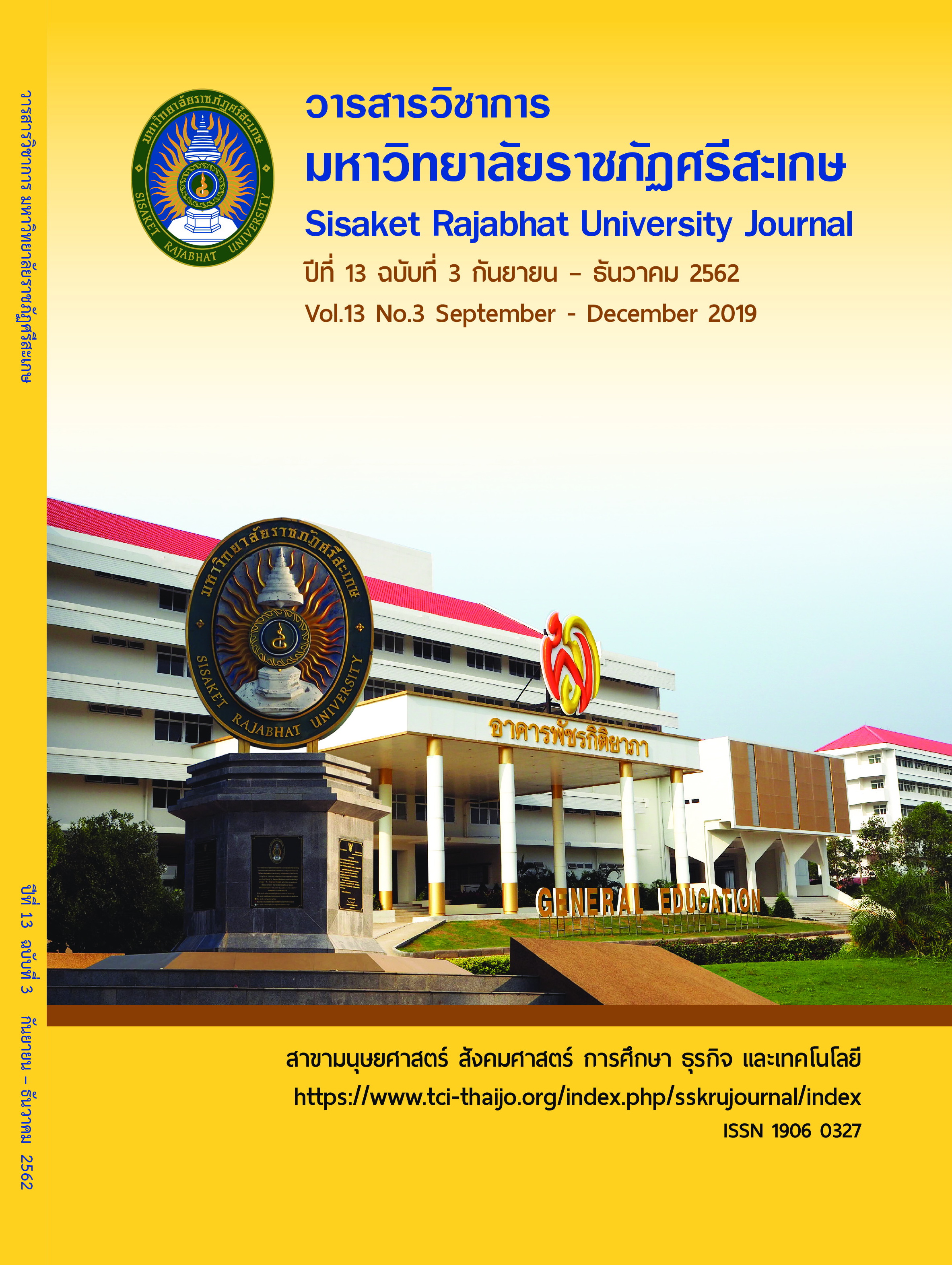ความสัมพันธ์ระหว่างการวางแผนภาษีกับนโยบายการจ่ายเงินปันผล ของบริษัทจดทะเบียนในตลาดหลักทรัพย์แห่งประเทศไทย
Main Article Content
บทคัดย่อ
งานวิจัยนี้มีวัตถุประสงค์เพื่อศึกษาความสัมพันธ์และผลกระทบของวางแผนภาษีกับนโยบายการจ่ายเงินปันผล โดยทำการเก็บรวบรวมข้อมูลจากบริษัทจดทะเบียนในตลาดหลักทรัพย์แห่งประเทศไทย โดยวิธีการศึกษาใช้ข้อมูลทุติยภูมิซึ่งเป็นรวบรวมข้อมูลงบการเงินของบริษัทจาก แบบ 56-1 และรายงานประจำปี ตั้งแต่ปี พ.ศ. 2558 จนถึง พ.ศ. 2560 ได้จำนวนข้อมูล 948 ข้อมูล และใช้เทคนิคการทดสอบสมมติฐาน คือ การวิเคราะห์ความถดถอยเชิงพหุ (Multiple Regression Analysis) และ การวิเคราะห์การถดถอยโลจิสติค (Logistic Regression) ซึ่งการวางแผนภาษีจะศึกษาทั้งการวางแผนภาษีที่ทำให้กำไรทางภาษีลดลงโดยวัดจาก อัตราภาษีเงินได้นิติบุคคลที่แท้จริง (Effective Tax Rate: ETR) และการวางแผนภาษีที่ทำให้ทั้งกำไรทางบัญชีและกำไรทางภาษีลดลงโดยวัดจาก อัตราส่วนภาษีเงินได้นิติบุคคลต่อกระแสเงินสดจากการดำเนินงาน (Tax/Cash Flow from Operations) กับอัตราส่วนภาษีเงินได้นิติบุคคลต่อสินทรัพย์รวม(Tax/Total Asset) นอกจากนี้ นโยบายการจ่ายเงินปันผลจะศึกษาทั้ง การจ่ายเงินปันผล อัตราการจ่ายเงินปันผล และเสถียรภาพการจ่ายเงินปันผล ผลการศึกษาพบว่า อัตราส่วนภาษีเงินได้นิติบุคคลต่อสินทรัพย์รวม มีความสัมพันธ์กับนโยบายที่ฝ่ายบริหารของกิจการใช้ในการตัดสินใจเพื่อจัดสรรผลกำไรสุทธิของธุรกิจให้แก่ผู้ถือหุ้นในรูปแบบเงินปันผล โดยมีลักษณะความสัมพันธ์เชิงบวก ซึ่งคือถ้ากิจการมีการวางแผนภาษีน้อย จะมีแนวโน้มที่กิจการจะจ่ายเงินปันผล
Article Details
1. เนื้อหาและข้อมูลในบทความที่ลงตีพิมพ์ในวารสารวิชาการมหาวิทยาลัยราชภัฏศรีสะเกษ ถือเป็นข้อคิดเห็นและความรับผิดชอบของผู้เขียนบทความโดยตรง ซึ่งกองบรรณาธิการวารสาร ไม่จำเป็นต้องเห็นด้วย หรือร่วมรับผิดชอบใด ๆ
2. บทความ ข้อมูล เนื้อหา รูปภาพ ฯลฯ ที่ได้รับการตีพิมพ์ในวารสารวิชาการมหาวิทยาลัยราชภัฏศรีสะเกษ กองบรรณาธิการไม่สงวนสิทธิ์ในการคัดลอกบทความเพื่อการศึกษา แต่ให้อ้างอิงแหล่งที่มาให้ครบถ้วนสมบูรณ์
เอกสารอ้างอิง
Amiram, D., Bauer, A. M., & Frank, M. M. (2018). Tax avoidance at public corporations driven by shareholder taxes: Evidence from changes in dividend tax policy. The Accounting Review.
Anderson, M., Rashid, H., & Warsame, H. (2017). Corporate Dividend Policy, Tax Avoidance and IRS Scrutiny.
Erickson, M. J. (2017). The Relation Between Firm Dividend Policy and the Predictability of Cash Effective Tax Rates.
Huseynov, F., & Klamm, B. K. (2012). Tax avoidance, tax management and corporate social responsibility. Journal of Corporate Finance, 18(4), 804-827.
Kari, S. , Karikallio, H. and Pirttilä, J. (2008), Anticipating Tax Changes: Evidence from the Finnish Corporate Income Tax Reform of 2005*. Fiscal Studies, 29: 167-196. doi:10.1111/j.1475-5890.2008.00072.x
Khaoula, F., & Moez, D. (2019). The moderating effect of the board of directors on firm value and tax planning: Evidence from European listed firms. Borsa Istanbul Review.
McClure, R., Lanis, R., Wells, P., & Govendir, B. (2018). The impact of dividend imputation on corporate tax avoidance: the case of shareholder value. Journal of Corporate Finance, 48, 492-514.
Olligs, P., & Tassius, A. Corporate Tax Planning and the Payout Ratio of Firms–Is the Dividend Penalty Linked to ETRs?. Determinants of Tax Planning, 65.
Rashid, H. U. (2018). Financing Decisions, CEO Managerial Skills and Corporate Tax Planning.
Sari, D. K., Utama, S., & Rossieta, H. (2017). Tax avoidance, related party transactions, corporate governance and the corporate cash dividend policy. Journal of Indonesian Economy and Business, 32(3), 190-208.
Sirait, F., and Siregar, S.V. (2014) Dividend payment and earnings quality: evidence from Indonesia. International Journal of Accounting and Information Management. 22 (2): 103-117.
Thaniunpong,S., Dechsiri, P. (2018) The Causal effect of tax planning on firms performance of Listed
Tong, Y.H. and Miao, B. (2011) Are dividends associated with the quality of earnings. Accounitng Horizons, 25 (1) : 183- 205.
กัลกนก จันทร์ และ ธนิดา จิตร์น้อมรัตน์. (2559). การศึกษานโยบายเงินปันผลที่ส่งผลต่อราคาหุ้นของบริษัทจดทะเบียนในตลาดหลักทรัพย์. http://www..dup.ac.th/graduate/journal.
กิติพงศ์ อรุพีพัฒนพงศ์. (2538). กลยุทธ์การวางแผนภาษี. พิมพ์ครั้งที่ 3 กรุงเทพ : การเงินธนาคาร.
คณิศร์ เจี้ยมดี. (2558). ปัจจัยที่มีผลต่อการจ่ายเงินปันผลอย่างต่อเนื่องของบริษัทจดทะเบียนในตลาดหลักทรัพย์ ค้นคว้าอิสระ หลักสูตรบัญชีมหาบัณฑิต มหาวิทยาลัยศรีปทุม. การประชุมวิชาการระดับชาติ มหาวิทยาลัยศรีปทุม. http://www.spu.ac.th.
บดินทร์ มหาวงศ์ และ ไพบูรย์ ผจงวงศ์. (2562). ความสัมพันธ์ระหว่างผลการดำเนินงานและการหลบหลีกภาษีเงินได้นิติบุคคลของบริษัทจดทะเบียนนตลาดหลักทรัพย์แห่งประเทศไทยในกลุ่ม SET100. วารสารเกษตรศาสตร์ธุรกิจประยุกต์, 15-39.
รสนา โชติสุวรรณ และสุภา ทองคง. (2562). ความสัมพันธ์ระหว่างการวางแผนภาษีกับราคาหุ้นสามัญของบริษัทจดทะเบียนในตลาดหลักทรัพย์แห่งประเทศไทย. RMUTT GLOBAL BUSINESS AND ECONOMICS REVIEW. 14 (1)
เริงรักษ์ จำปาเงิน. (2544). การจัดการการเงิน. พิมพ์ครั้งที่ 2. บริษัท บุ๊คเน็ท จำกัด: กรุงเทพ.
สมเดช โรจน์คุรีเสถียร และ คณะ. (2553). ถอดรหัสใบกำกับภาษี กรุงเทพฯ: ธรรมนิติเพลส.
สัตยา ตันจันทร์พงศ์ และ พัทธ์ยศ เดชศิริ. (2561). ผลกระทบเชิงสาเหตุระหว่างการวางแผนภาษีกับผลการดำเนินงานของบริษัทจดทะเบียนในตลาดหลักทรัพย์แห่งประเทศไทย. วารสารวิชาการ มหาวิทยาลัยหอการค้าไทย มนุษย์ศาสตร์และสังคมศาสตร์ ปีที่ 38, ฉบับที่ 3 เดือน : 1-13.
สัตยา ตันจันทร์พงศ์. (2018). ผลกระทบของการวางแผนภาษีเงินได้นิติบุคคลกับมูลค่ากิจการ: หลักฐานเชิงประจักษ์จากบริษัทจดทะเบียนในตลาดหลักทรัพย์แห่งประเทศไทย. Journal of Modern Management Science, 11(2), 42-57.
สัตยา ตันจันทร์พงศ์. (2557). อิทธิพลของการกำกับดูแลกิจการ การบริหารกำไรและการวางแผนภาษีที่มีต่อผลการดำเนินงานของบริษัทจดทะเบียนในตลาดหลักทรัพย์แห่งประเทศไทย. วิทยานิพนธ์ปริญญามหาบัณฑิต, มหาวิทยาลัยนเรศวร.
สุนันท์ ศรีจันทรา. (2562). ผลตอบแทนงามๆ จาก “หุ้น” / สุนันท์ ศรีจันทรา. ค้นเมื่อ 28 ก.ย. 2562, จาก https://mgronline.com/stockmarket/detail/9620000089984
อมรศักดิ์ พงศ์พุศฒน์. (2555) กลยุทธ์การวางแผนภาษีขั้นสูง. กรุงเทพ :ชวนพิมพ์.
อาทิตยา กุลธีณี. (2559). ปัจจัยที่มีผลกระทบต่อการวางแผนภาษีของบริษัทจดทะเบียนในตลาดหลักทรัพย์แห่งประเทศไทย กรณีศึกษา กลุ่มอุตสาหกรรมบริการ. บัญชีมหาบัณฑิตและวิทยาศาสตร์มหาบัณฑิต สาขาวิชา การภาษีอากร.


